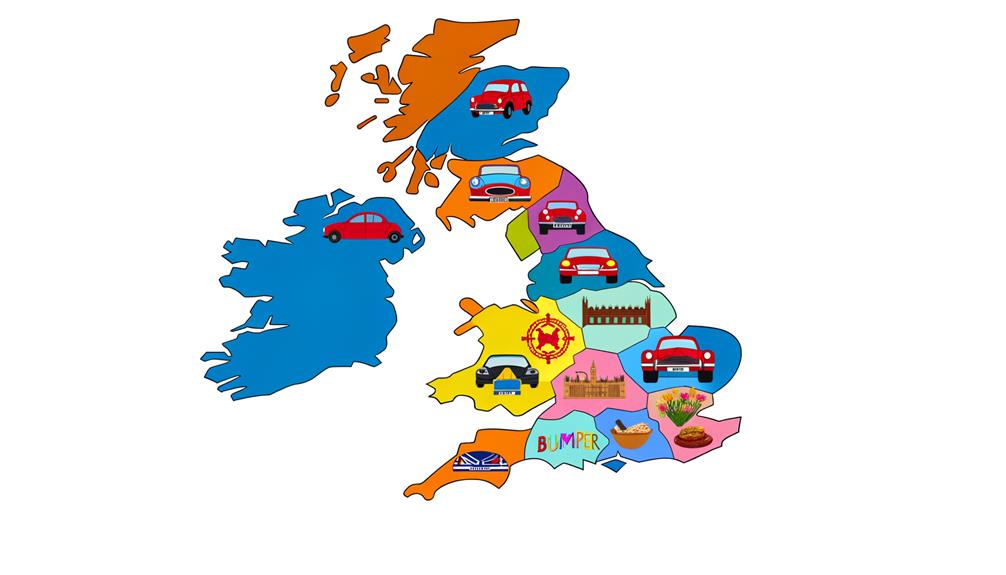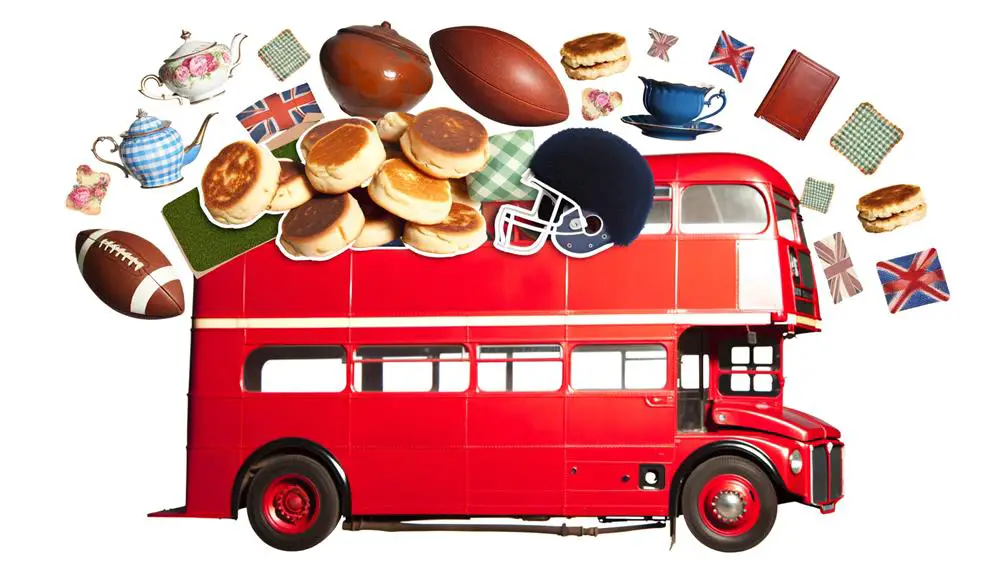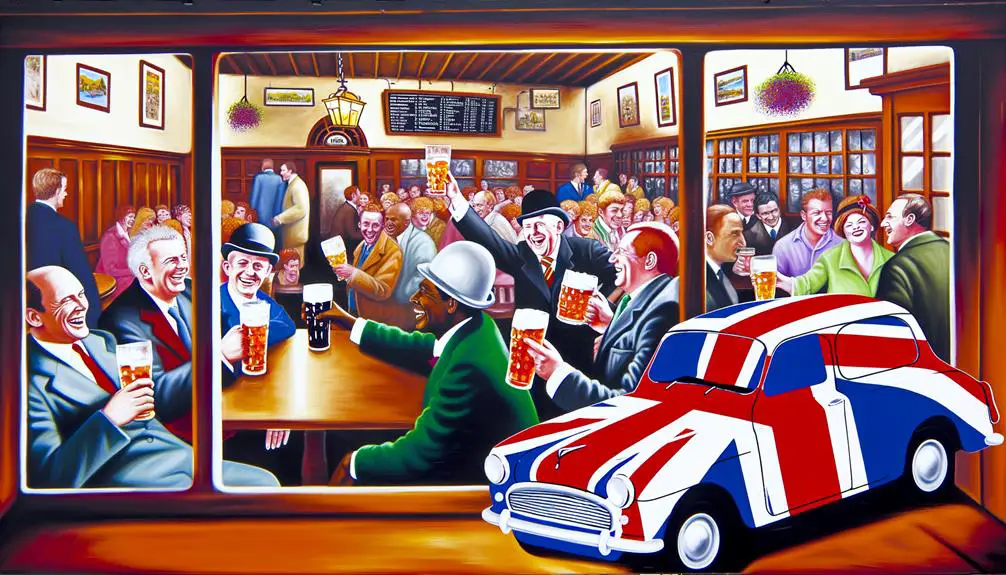In British slang, "bumper" means much more than you'd initially think. It's a term steeped in celebration, tracing back to the 17th century as a large glass of beer or wine. Over time, "bumper" evolved to signify abundance and good cheer, mirroring societal values. Today, it's used across regions with slight variations, from signifying something large in Northern England to an unexpected bonus in Wales. Whether it's a "bumper crop" or a "bumper year," this word beautifully combines historical reverence with contemporary celebration. Its rich etymology and diverse applications underscore its cultural significance, revealing a deeper understanding of British colloquialism.
Key Takeaways
- In British slang, 'bumper' often signifies something large, substantial, or in abundance.
- It can denote a situation or item that is excellent, splendid, or celebratory.
- 'Bumper' is used regionally to describe an unexpected bonus or surplus, reflecting local dialects.
- The term has evolved from its origins in celebrating with large drinks to include positive excesses or successes.
- Examples include 'bumper crop' for a large yield and 'bumper year' for an exceptionally good year.
Origins of "Bumper"

The term 'bumper' has a rich etymology, tracing back to the early 17th century where it initially referred to a large glass of beer or wine, showcasing how language evolves alongside cultural practices. This historical context paints a vivid picture of the linguistic evolution that words undergo, reflecting shifts in societal norms and values. In those times, a 'bumper' wasn't just a casual reference to a drink but a symbol of celebration, abundance, and good cheer, deeply embedded in the social fabric of the era.
As you explore further into the origins of 'bumper,' you'll find that its journey from a term denoting a generous pour of one's favorite libation to its various meanings today is a fascinating example of how words can stretch and adapt over time. This transformation is not merely about linguistic evolution; it's a mirror to the changing landscapes of society itself, where terms capture the zeitgeist of their times and evolve to fit new contexts.
Understanding 'bumper' in its original sense provides you with a snapshot of historical social practices, offering insights into how language serves as a living, breathing entity that grows and changes with each generation. This analysis underscores the importance of appreciating words within their all-encompassing historical and cultural frameworks, enriching your grasp of linguistic evolution.
Common Uses Today
In contemporary vernacular, 'bumper' has diverged considerably from its historical roots, now encompassing a range of meanings that reflect modern societal and technological advancements. You'll find that in today's usage, 'bumper' frequently relates to car protection, serving as a critical component designed to absorb and mitigate shock during minor collisions. This application signifies a shift towards a more material and pragmatic use of the term, far removed from its earlier, more festive connotations.
However, the spirit of celebration hasn't been entirely lost in the evolution of 'bumper'. It still retains its place in social settings, albeit in a transformed manner. When someone raises a 'bumper' toast, they're not just harking back to a bygone era of bountiful harvests; they're actively participating in a tradition of celebrating major achievements, milestones, or simply the joy of togetherness. This usage embodies a blend of historical reverence and contemporary celebration, showcasing the term's versatility and enduring relevance.
Analyzing the current applications of 'bumper', it's evident that while the term has adapted to fit new contexts, it maintains a connection to its roots through the underlying themes of protection and celebration, illustrating the dynamic nature of language in reflecting changing societal values and technologies.
Regional Variations

Across various regions, you'll find that 'bumper' takes on distinct nuances, reflecting local dialects and cultural idiosyncrasies. The evolution of slang is deeply intertwined with the fabric of regional identities, making the term 'bumper' a fascinating case study in dialect differences and slang evolution.
- In Northern England, 'bumper' might be used to describe something large or substantial, aligning closely with its more general UK-wide meaning but often applied to describe generous portions of food or drink.
- Scottish interpretations can lean towards the celebratory, where a 'bumper' is not just large but also excellent or splendid, especially when referring to celebrations or successful events.
- In Wales, the term takes a slightly different twist, often used to describe an unexpected bonus or surplus, reflecting a more outcome-oriented interpretation.
- Southern English usage tends to align with the standard British interpretation but with a notable emphasis on abundance and prosperity, particularly in the context of harvests or business success.
Understanding these regional variations requires an analytical approach, appreciating not just the word itself but its role within the broader context of dialect differences and the ongoing evolution of slang. Each variation sheds light on local values, humor, and the social fabric of the region, offering a richer understanding of 'bumper' beyond its surface meaning.
Cultural Significance
Delving into 'bumper's' cultural significance reveals how it mirrors societal values and collective experiences, shaping and being shaped by the communities that use it. This term, deeply embedded in British slang, offers a window into the dynamic interplay between language and society. It's a demonstration of slang evolution, highlighting how language adapts to reflect the changing priorities, interests, and even the humor of a culture.
The societal impact of 'bumper' extends beyond mere vocabulary enrichment. It encapsulates specific moments in time, serving as a linguistic marker that can denote abundance, celebration, or even excess in various contexts. This adaptability underscores the flexibility of slang to encapsulate complex ideas succinctly, making it an invaluable tool for social cohesion and identity.
Moreover, 'bumper' illustrates the power of language to forge connections across different strata within the British Isles. Its usage can signal in-group membership, creating a sense of belonging and shared understanding among speakers. Therefore, the evolution and persistence of 'bumper' in British slang not only enrich the English language but also fortify the cultural fabric, underscoring the inseparable link between language, identity, and community.
Surprising Examples

Exploring the term 'bumper' uncovers a wealth of surprising examples that vividly illustrate its versatility and depth within British slang. While you might initially think of something purely physical, like a part of a car, the term dives into more abstract and culturally rich territories. Its usage spans across various contexts, from everyday conversations to special occasions, showcasing its unusual interpretations and celebratory contexts.
- A bumper crop: This phrase doesn't just refer to agriculture but signifies any large or successful yield, showing how 'bumper' embodies abundance and prosperity within British vernacular.
- A bumper issue: In publishing, a 'bumper issue' of a magazine or journal isn't just a special edition; it represents an overflow of content, often tied to celebrations or significant events, highlighting the term's festive connotations.
- Bumper to bumper: While this might seem straightforward, referring to heavy traffic, it also conveys a sense of fullness and saturation in a uniquely vivid manner, illustrating the term's adaptability.
- A bumper year: This term is often used to describe an exceptionally good year, whether regarding personal achievements, business success, or even wine quality, underscoring 'bumper's' association with celebration and exceptional success.
These examples demonstrate 'bumper's' multifaceted nature within British slang, revealing a term that's as dynamic and lively as the culture it belongs to.







